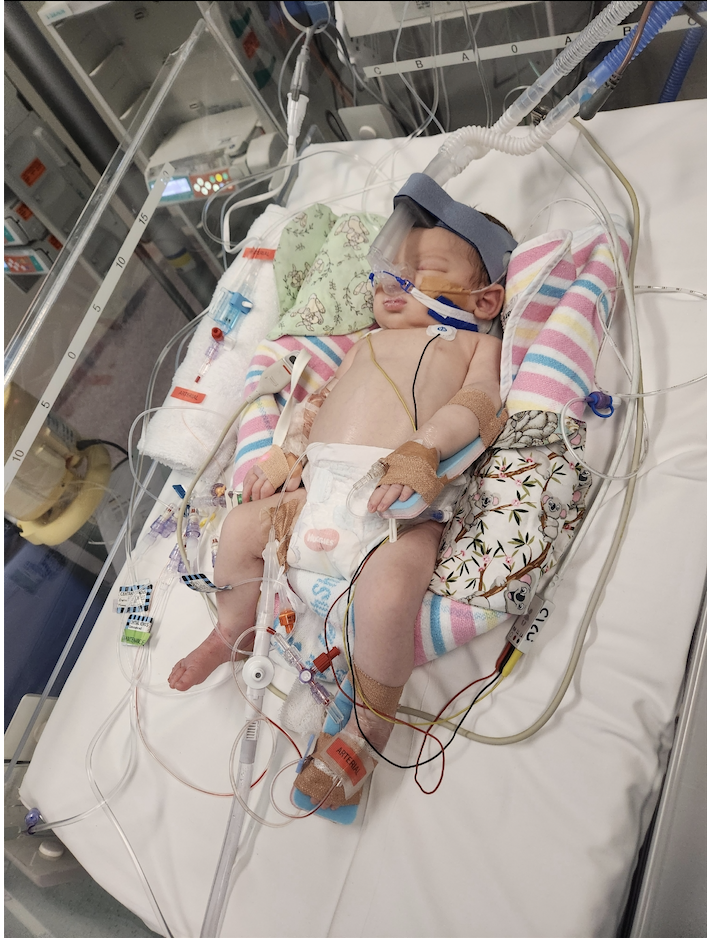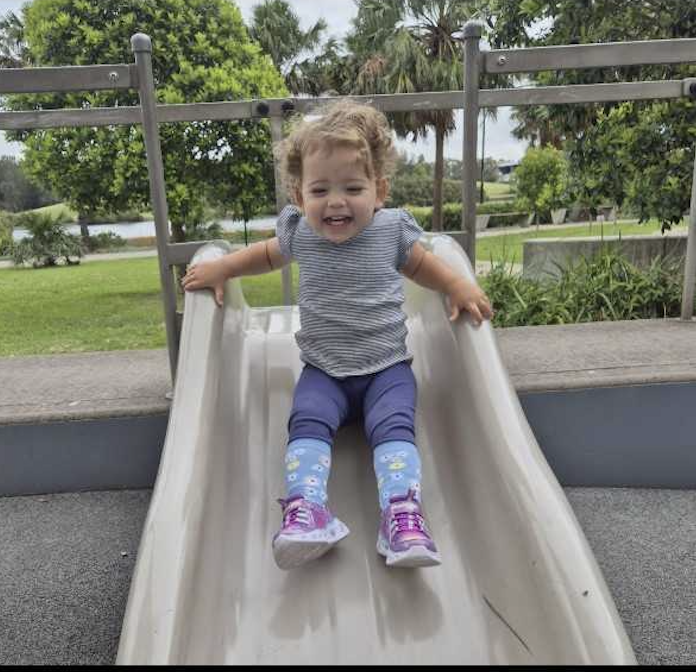In July 2023, I gave birth to our beautiful second daughter, Avalie. It was a challenging C-section, but we were both discharged home on day two. Avalie was feeding well and seemed healthy.The next day, everything felt normal as we adjusted to life with two little ones. But that night, my mum intuition felt off. I couldn’t explain why because Avalie looked fine and her temperature was normal, yet something inside me knew something was not right.I stayed up all night watching her breathing. Around 5am, she started grunting with every breath, and her temperature had risen to 38.4°C.
As a newborn under midwife care, I immediately called the midwives, who told me to bring her straight to Hornsby Hospital’s Special Care Nursery. Avalie was assessed by midwives and paediatricians who worked tirelessly to find the cause of her fever. After multiple tests, she was diagnosed with enterovirus sepsis. We still do not know exactly how she contracted the virus, as no one around her was unwell, but enterovirus can present as a mild cold in adults and older children. Please, if you have even mild symptoms, avoid visiting newborns and always practise good hand hygiene.Soon after her diagnosis, Avalie began to deteriorate. Her heart rate and oxygen levels were unstable, she needed oxygen support, stopped breastfeeding, and required a feeding tube and IV fluids. Blood tests showed the virus was affecting her liver, heart and brain, and she started having seizures. It was devastating to watch our helpless baby suffer so severely.
The team at Hornsby Hospital recommended transferring her to the NICU at Royal North Shore Hospital (RNSH) via the NETS ambulance for more specialised care. Before the transfer, Avalie had a severe reaction to her seizure medication and stopped breathing. Watching her turn blue as the doctors and nurses rushed in to resuscitate her was the most terrifying moment of our lives.Thankfully, they revived her, and she was transferred to RNSH via the NETS ambulance. While there, Avalie developed disseminated intravascular coagulation (DIC), a life-threatening complication of sepsis that can cause organ damage and severe bleeding. Doctors also suspected she had developed a rare immune response to the infection. By this point, we were only five days into the illness, and we were told Avalie’s chance of survival was around 20 percent.
Our world collapsed. My husband stayed home caring for our 2.5 year-old while I sat beside Avalie in the NICU, barely sleeping, just waiting and hoping.Avalie was later transferred to the Sydney Children’s Hospital, Randwick for further specialist care. She was seen by cardiology, neurology, and intensive care teams who provided life-saving treatment and round-the-clock monitoring. Despite constant setbacks, including seizures, unresponsiveness, and ongoing instability, Avalie fought through.After five weeks in hospital, we finally brought her home. Catching her illness early made all the difference. Because we sought help as soon as she spiked a fever, Avalie received the urgent treatment that saved her life.
Recovery was not simple or quick. Avalie remained on seizure medication for six months and required frequent blood tests to monitor her liver and heart. She continues to be followed by the Rehab for Kids Clinic to monitor potential long-term effects from the enterovirus and sepsis.Today, Avalie is a happy, cheeky 2 year-old. We do not know exactly what the future holds because she has some residual brain injury from the virus, but she is here, she is thriving, and for that we are endlessly grateful.After Avalie recovered, we learned that two other newborns in our area had contracted the same virus but tragically did not survive. It was a painful reminder of how serious sepsis can be, especially in newborns and young children.We share Avalie’s story to raise awareness of the signs, symptoms, and urgency of sepsis, and to remind parents, especially mothers, to trust their intuition. If something feels off, even when the signs seem small, seek medical help immediately.
Early intervention can be the difference between life and death.We are forever grateful to the incredible teams at Hornsby Hospital, Royal North Shore Hospital, and Sydney Children’s Hospital, Randwick, whose care, expertise, and compassion saved our daughter’s life.


